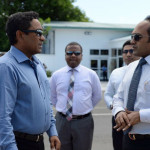President Abdulla Yameen has re-established the Council of Higher Education, appointing his Vice President Dr Mohamed Jameel Ahmed its head, local media has reported.
Haveeru has reported that the council will be tasked with setting the criteria for courses at Maldivian higher education facilities as well as handling the transferring of students’ credit.
Joining the vice president on the council is reported to be six cabinet ministers from the ministries of health, youth, finance, fisheries, environment, and the Islamic Ministry.
They will be joined by Villa College rector Dr Ahmed Anwar, Dr Simad Saeed, Dr Ibrahim Saeed, Deputy Education Minister Azleen Ahmed, Director General of the Education Ministry Fathimath Amira, and Chancellor of the Maldives National University Dr Mohamed Zahir Hussein.
Vice President Jameel yesterday visited the Maldives National University, explaining that expanding academic opportunities was of the utmost importance to the new government.
Earlier this week, the Anti-Corruption Commission ordered the reevaluation of vetting procedures in the previous administration’s tertiary student loan initiative.
“[THe] Vice President spoke of the government’s vision to introduce short term professional training programmes for youth in fields such as offshore-financing, managerial economics, banking, accounting, auditing and tourism,” read a President’s Office press release.
During the meeting, Jameel also noted the government’s desire to include the youth in nation building.
Recently appointed Home Minister Umar Naseer this week revealed his intention to introduce obligatory government service for school leavers, explaining his motivations to Minivan News:
“We need to bring youth into a disciplined system where they get up early, become presentable, pray, have breakfast, work, and well, become responsible.”
“One of my objectives is to increase the number of trained professionals which will be useful in protecting the independence of a small country like ours, ” Naseer continued.
The Ministry of Education last week released its aims for the first 100 days of the Yameen administration, revealing a 19-point plan including the introduction of the Quran as a subject for grades 1-7, greater civic education, as well as greater professional standards for teachers.
According to the Ministry, the government will choose two islands to establish Arabic medium schools within the first 100 days as well as expanding special education and child protection policies.
As part of this plan the ministry is seeking to assign Quran teachers for all Schools before the academic year 2014. The ministry’s Permanent Secretary Dr. Abdul Muhsin Mohamed said that the ministry is still short of 26 Quran teachers to achieve this this objective.






How do trained professionals help the independence of our small country? Using what? And against who? Who is threatening our independence?
In my presence Dr. Zahir Hussain has said "It would be no good if all our children were degree holders". The country has also not forgotten that this man was responsible for JSC to prevent our youth to reach higher education goals. He is the most unfit person to lead the University of Maldives. A failure as Education as well as Youth and Sport Minister. He should not be allowed anywhere near the university. This comment was denied on Haveeru, as expected.
Many Maldivian leaders of the past did not believe in universal education; they wanted it to be a privilege of the 'royal'(beyfulhu) class only. This attitude can be even seen in some posts here by an individual belonging to that era and probably that class, some of which are very patronising, others claiming that 'Maldivians can or can't write this or that' or giving the absurd and laughable suggestion that he has a monopoly over knowledge of Maldives and things Maldivian and that, on the flimsiest of bases - authority!!!
The most notorious leader of the past in obstructing the development of education in the Maldives would be Hasan Fareed. He argued that universal education in the Maldives would make people politically aware and thus difficult to control! This same attitude can be seen in a speech given at Majeediyya in mid-seventies by Hon. Shihab who pointed out that at one stage, it was suggested that the Ministry of Education be abolished as it did nothing except the selling of 'Bodu Tharutheeb'! Many also would be aware that scholarships used to be a privilege of 'royal' or 'influential' families.
Definitely Dr Z Hussein seems not to have believed in education for all when held the top post at the Education Ministry. It would not be entirely wrong to say JSC was indeed devised to reduce the number of students who would achieve even a secondary level certificate. In addition, there are a number of cases, while he was the Education Minister, where he had endeavoured to stop individuals going abroad to study at their own expenses. He had also written letters to some universities in the Middle East seeking to block independent candidates getting admission to those universities. Due to this and his lack of integrity (one such case is the way he handled the 'Naseem-Soa' case and also how came to 'own' the Haveeru daily - Once a residing Maldives Chief Judge informed him that he will face some serious challenges re legal ownership of 'Haveeru'. (If you would want to know more on line to follow would be to ask yourself why was there a Haveeru News Agency 'office' which apparently had nothing to do with 'Haveeru' at a house in Ameeru Ahmed Rd close to Majeediyya!) Therefore, I agree he is morally unfit to occupy the top post, even an honorary one, at the Maldives University. It is irresponsible of the leadership who gave him the position in the first place as well as those who continue to endorse him.